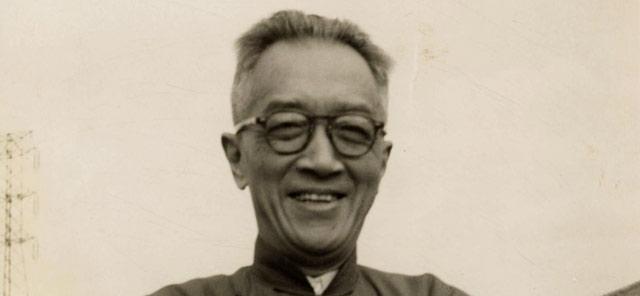Mr. Hu Shi himself was extremely controversial and had mixed reputations. Some admired him for his knowledge and his boldness; some hated him because they disagreed with his political views; and some denigrated him for his affair. But he is him, the only Hu Shi in the whole world, the one who is indebted to history.
Hu Shi was born on December 17, 1891 in Shangzhuang, Jixi, Anhui Province, where his father and his grandfather and great-grandfather were merchants. According to Hu Shi's word count, he was familiar with more than a thousand words at the age of three, and then he entered the family school and read the Four Books and Five Classics. At the age of thirteen, he left his hometown to study in Shanghai, the economic and cultural center of the time.
He attended the famous Meixi Academy and Chengzhen Academy, and later entered Chinese public schools. In 1908, he naturally did not miss the "noisy school wave" of Chinese public schools. Hu Shi showed extraordinary planning and organizational skills, and withdrew from school with his classmates, and he created the name of "China's New Public School" according to the old name of the school, in order to express his dissatisfaction with the newly established school board trampling on democratic freedoms and ignoring students' rights.

In June 1910, with his outstanding results, Hu Shi obtained the qualification of staying in the United States for official expenses, thus beginning his seven-year study abroad life.
These seven years of overseas study had a profound impact on him personally, and before that, most of the old-fashioned education he was exposed to was a strong feudal color. Overseas, he was able to personally experience and study the Political Systems and Advanced Ideologies of Europe and the United States.
In September 1915, Chen Duxiu founded the Youth Magazine in Shanghai, and after the release of the first volume, the reverse was drastic, and then the Youth Magazine was renamed "New Youth". Coincidentally, Chen Duxiu and Hu Shicha were fellow villagers, and the former entrusted people to mediate between them and asked Hu Shi to write an article for the New Youth.
Hu Shi was greatly shaken, and in his busy schedule, he translated a Russian novel, "Duel", in the form of a vernacular that had not yet been promoted at that time. The article was published in the first volume of the second volume of New Youth, and it became the first novel published by New Youth in vernacular.
This move greatly promoted the promotion of vernacular literature, and Hu Shi's subsequent publication of "Discussion on Literary Reform" awakened countless young scholars to open their eyes and accept new ideas. This laid the foundation for Hu Shi's important position in the new cultural movement.
In 1916, Hu Shi, who returned to China after completing his studies, became the dean of the Liberal Arts Department at Peking University. He teaches the history of Chinese philosophy, does not fall behind, and leads the class in a personal way. Because it was so wonderful, it attracted his science students and even people outside the school to often come to listen to the lectures, which was a sensation.
Although a man of letters, Hu Shi was also extremely concerned about politics, paying attention to the international situation and worrying about national security.
In 1937, marked by the outbreak of the Lugou Bridge Incident, the Japanese invasion of China broke out in full swing. Faced with an unprecedentedly dangerous situation, Hu Shi realized that the great enemy was in the head, and there was no way to retreat. He changed his previous position of negotiating peace with Japan and avoiding war, and resolutely supported the counterattack against the Japanese.
He was then sent as an unofficial envoy to the United States and Europe as an unofficial envoy, hoping to exchange his three inches of uncorrupted tongue for international assistance in China's War of Resistance Against Japan. In August of the following year, he was appointed ambassador to the United States, and thanks to his efforts, China was able to receive international assistance in many ways.
It was a time of great war, the situation was turbulent, and the people's hearts were uneven. There are not a few intellectuals who have turned their backs on the motherland and are aiming for the Japanese aggressors. Hu Shi, the iron-boned Hu Shi, is naturally not among them. He had faith in China and put his heart and soul into the final victory. He used his backbone to support the backbone of the literati and justify the name of the literati, who said, "A hundred useless are students"?
Such a literati who is both knowledgeable and courageous, unwilling to live his life, has no connection with peace and joy in his later years.
In April 1958, Hu Shi returned to Taiwan after nearly a decade of exile in the United States. An old man in his sixties spends nearly one-sixth of his life on the move. He finally had to return to his homeland, and he did not enjoy several years of well-being. On February 24, 1962, Hu Shi died suddenly of a heart attack.
After being counted, Hu Shi's inheritance is only 135 US dollars, about 332.1 yuan, which is evident in the final poverty of the old man who has been living for half a lifetime.
After Hu Shi's death, he was awarded the honor. His epitaph is surging and sonorous, from the hand of the well-known scholar Mao Zishui, written by the famous Jinshi master Wang Zhuang. Although Hu Shi died, his achievements and contributions are still alive, his ideas and ideas are followed by others, and the students who have been taught by him have lived up to expectations. Wouldn't all this be a great blessing for the literati?
bibliography:
The Biography of Hu Shi